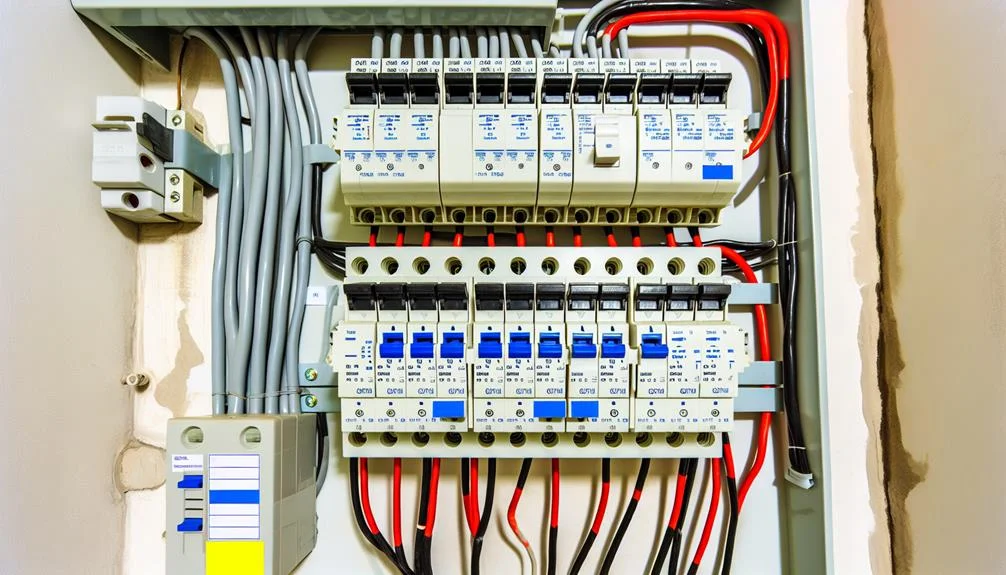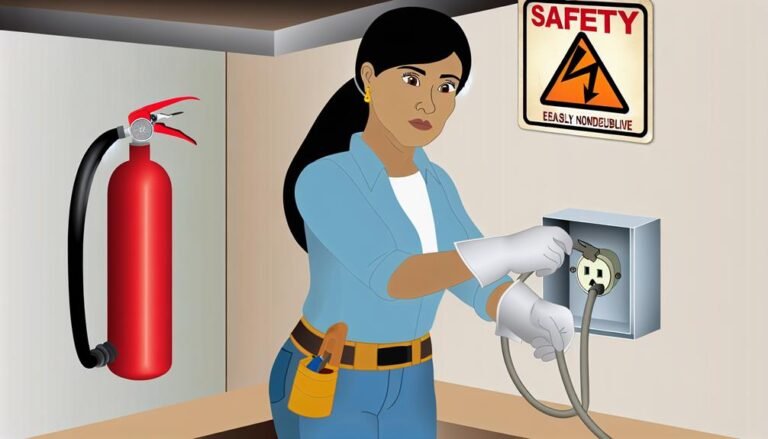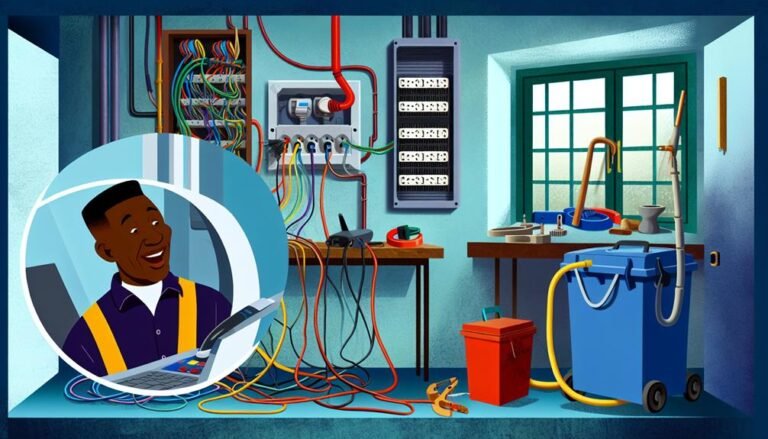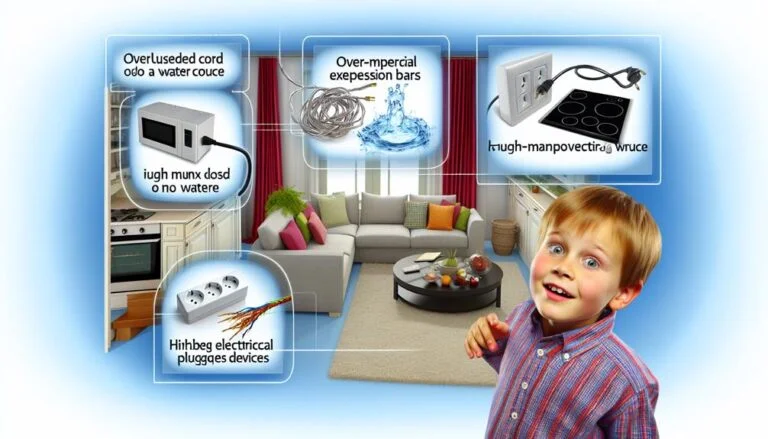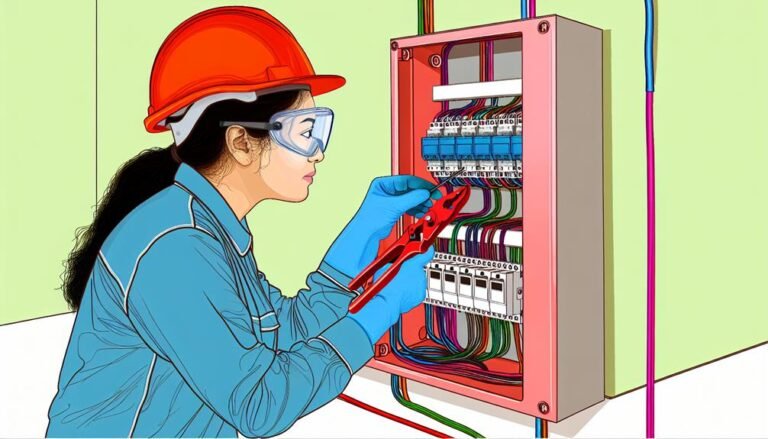You're in the comfort of your own home, surrounded by the familiar sights and sounds that bring you solace. But amidst this haven, there lurks a hidden danger, silently waiting to strike.
Yes, we're talking about the potential hazards associated with home electrical systems. Don't worry, though. We're here to shed light on the top tips for home electrical safety, ensuring that you and your loved ones can enjoy your sanctuary without any unnecessary risks.
So, let's take a closer look at some simple yet vital measures that can help keep your home safe from electrical mishaps.
Key Takeaways
- Regularly inspect and maintain electrical appliances and cords to prevent fire hazards and accidents.
- Avoid overloading electrical outlets and extension cords to prevent electrical fires and damage to appliances.
- Use grounding and surge protection measures to ensure safety and prevent electric shock and damage to electronics.
- Educate family members on electrical safety practices, including fire prevention, proper appliance use, and the dangers of downed power lines.
Understand Basic Electrical Safety Measures
To ensure your safety when dealing with home electrical systems, it's crucial to understand and follow basic electrical safety measures. By being aware of and avoiding common electrical hazards, you can greatly reduce the risk of accidents and potential harm.
One of the most important safety measures is to never overload electrical outlets or extension cords. Overloading can lead to overheating, which may result in electrical fires.
Additionally, it's essential to regularly inspect electrical cords for any signs of damage, such as fraying or exposed wires. Damaged cords can cause electric shocks and pose a serious threat to your safety.
Another important measure is to keep electrical appliances away from water sources and damp areas. Water is a conductor of electricity, and contact between electricity and water can lead to severe injuries or even death.
Lastly, always use the appropriate electrical tools and equipment when working with electrical systems. Using improper tools or equipment can increase the risk of electrical accidents.
Proper Use and Maintenance of Electrical Appliances
Ensure the proper use and maintenance of your electrical appliances to prevent accidents and ensure their longevity. Follow this electrical appliance maintenance checklist to keep your appliances in top shape:
- Regular cleaning: Dust and dirt can accumulate on electrical appliances, posing a fire hazard. Clean them regularly using a soft cloth and mild cleaning solution.
- Inspect cords and plugs: Check for any signs of wear and tear, such as frayed cords or loose plugs. Replace damaged cords or plugs immediately to avoid electrical shocks or short circuits.
- Avoid overloading: Don't plug too many appliances into a single outlet or power strip. Overloading can lead to overheating and cause electrical fires. Use power strips with surge protectors for added safety.
- Unplug when not in use: When appliances aren't in use, unplug them. This not only saves energy but also reduces the risk of electrical accidents.
Importance of Grounding and Surge Protection
Now let's shift our focus to the importance of grounding and surge protection in maintaining electrical safety and preventing potential hazards. Electrical grounding plays a crucial role in ensuring the safety of your home's electrical system. It provides a pathway for electricity to flow safely into the ground, preventing the risk of electric shock and fires. By connecting all electrical devices and appliances to the grounding system, you create a reliable and stable electrical network.
Surge protectors are another essential component of electrical safety. These devices protect your electronics from sudden voltage spikes or surges that can damage or destroy them. Surge protectors work by diverting excess voltage away from your devices, preventing them from being overloaded. This not only saves you from the inconvenience of replacing damaged electronics but also prevents potential electrical fires.
To help you understand the importance of grounding and surge protection, let's take a look at the table below:
| Importance of Electrical Grounding | Benefits of Surge Protectors |
|---|---|
| Prevents electric shock and fires | Protects electronics from voltage spikes |
| Ensures a stable electrical network | Saves money by preventing damage to electronics |
| Provides a safe pathway for electricity | Prevents potential electrical fires |
| Protects appliances and equipment | Gives you peace of mind |
Safe Practices for Electrical Wiring and Outlets
When working with electrical wiring and outlets, it's important to follow safe practices to minimize the risk of electrical hazards. Here are some tips to help you ensure electrical fire prevention and avoid common electrical hazards:
- Proper wiring installation: Make sure that the electrical wiring in your home is installed correctly and meets the required standards. Faulty wiring can lead to electrical fires and other hazards.
- Outlet maintenance: Regularly check your outlets for any signs of damage, such as loose or cracked outlets. Replace any damaged outlets immediately to prevent electrical shocks or fires.
- Avoid overloading outlets: Don't plug too many devices into a single outlet or use extension cords for long-term use. Overloading outlets can cause overheating and increase the risk of electrical fires.
- Ground fault circuit interrupters (GFCI): Install GFCI outlets in areas where water is present, such as kitchens, bathrooms, and outdoor areas. GFCIs help to prevent electrical shocks by quickly shutting off the power if they detect a ground fault.
Educating Family Members on Electrical Safety
To further prioritize home electrical safety, it's crucial to educate your family members on the proper precautions and practices to minimize the risk of electrical hazards. By creating awareness and providing necessary information, you empower your loved ones to make informed decisions and take necessary steps to prevent accidents.
One important aspect of electrical safety that should be emphasized is fire prevention measures. Make sure your family understands the importance of not overloading electrical outlets, using surge protectors, and avoiding the use of damaged or frayed electrical cords. It's also essential to educate them on the proper use and storage of flammable materials, such as cleaning agents or gasoline, to prevent accidental fires.
Additionally, educating your family on electrical safety during storms is crucial. They should be aware of the dangers of using electrical appliances during thunderstorms and the importance of unplugging them to avoid power surges. It's also important to emphasize the need to stay away from downed power lines and to never touch them, as they can be energized and pose a serious risk of electric shock.

